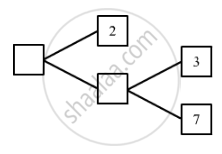Advertisements
Advertisements
Question
Write the denominator of the rational number `257/5000` in the form 2m × 5n, where m, n are non-negative integers. Hence, write its decimal expansion, without actual division.
Solution
Denominator of the rational number `257/5000` is 5000.
Now, 5000 = 2 × 2 × 2 × 5 × 5 × 5 × 5
= (2)3 × (5)4, which is of the type 2m × 5n where m = 3 and n = 4 are non-negative integers.
∴ `257/5000 = 257/(2^3 xx 5^4) xx 2/2` ...[Multiplying numerator and denominator by 2]
= `514/(2^4 xx 5^4)`
= `514/(10)^4`
= `514/10000`
= 0.0514
Hence, 0.0514 is the required decimal expansion of the rational number `257/5000` and it is also a terminating decimal number.
APPEARS IN
RELATED QUESTIONS
Classify the numbers `22/7` as rational or irrational:
State whether the given statement is true or false:
(1) The sum of two rationals is always rational
Write the decimal expansion of `73/ ((2^4×5^3))`
Express 0.`bar(4)` as a rational number simplest form.
Write down the decimal expansions of the following rational numbers by writing their denominators in the form 2m × 5n, where, m, n are non-negative integers.\[\frac{14588}{625}\]
Write the condition to be satisfied by q so that a rational number\[\frac{p}{q}\]has a terminating decimal expansions.
Complete the missing entries in the following factor tree.

State whether the following rational number will have a terminating decimal expansion or a non-terminating repeating decimal expansion:
`23/(2^3xx5^2)`
Write down the decimal expansion of the following number which have terminating decimal expansion.
`64/455`
The decimal form of `129/(2^5 5^7 7^5)` is ______.
